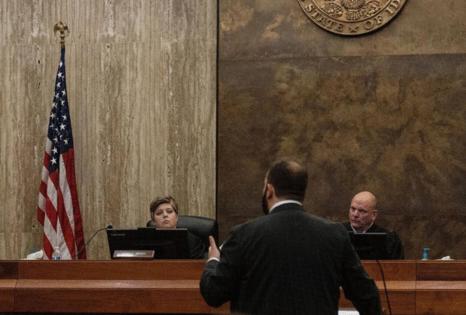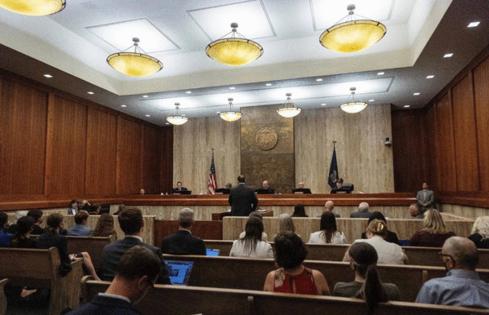Idaho Supreme Court rules on Thomas Creech's last state appeal to avoid death penalty
Published in News & Features
BOISE, Idaho — Idaho’s high court dismissed a final state appeal from Thomas Creech on Wednesday, leaving the federal courts to decide whether Idaho can try again to execute its longest-serving death row prisoner after a failed attempt earlier this year.
The Idaho Supreme Court unanimously rejected Creech’s arguments that a second execution attempt would represent cruel and unusual punishment under the Eighth Amendment of the U.S. Constitution. In February, the execution team was unable after nearly an hour to find a vein in Creech’s body suitable for an IV to lethally inject him, and prison leaders called off the execution.
Creech became the first-ever prisoner to survive an execution in Idaho and just the sixth in U.S. history to survive one by lethal injection, according to the Washington, D.C.-based Death Penalty Information Center.
Creech alleged in his appeal that another lethal injection attempt, this time possibly with a stepped-up method known as a central line IV, which uses a catheter through a jugular in the neck, or vein in the upper thigh or chest, would violate his constitutional rights. A lower state court ruled against the claim last month.
“The application does not support, with any likelihood, the conclusion that the pain other inmates purportedly suffered in other states establishes an ‘objectively intolerable’ risk of pain for Creech, as required under the Eighth Amendment,” Idaho Chief Justice G. Richard Bevan wrote for the court.
Idaho’s five justices also ruled against Creech in a similar appeal earlier this month.
The court’s ruling Wednesday sided with Idaho Attorney General Raúl Labrador’s office and was determined on legal briefs alone. No oral arguments were scheduled in the appeal.
Justice Colleen Zahn recused herself from Creech’s appeal and was replaced by Senior Justice Roger Burdick, who retired from the court in 2021. Zahn cited her decadelong tenure in the Attorney General’s Office before her appointment to the Supreme Court bench, state courts spokesperson Nate Poppino previously told the Idaho Statesman.
The State Appellate Public Defender’s Office, Creech’s attorneys in the case, did not immediately respond to a request for comment from the Idaho Statesman. The Attorney General’s Office declined to comment Wednesday after the ruling.
The Federal Defender Services of Idaho, which represents Creech in three other active appeals in federal court, declined to comment, including over its own federal appeal with the same legal arguments as the case just dismissed by the Idaho Supreme Court. Creech also has declined any interviews at this time through his attorneys.
Creech was set to be executed earlier this month after he was served with a death warrant from Ada County Prosecuting Attorney Jan Bennetts’ office. A federal judge issued a stay and hit pause on the scheduled execution timeline before Idaho could follow through on the state’s first execution in more than a dozen years.
Creech, 74, has been incarcerated for 50 years on five murder convictions, including three victims in Idaho. His standing death sentence stems from the May 1981 beating death of fellow prisoner David D. Jensen, 23, for which Creech pleaded guilty. Before that, Creech was convicted of the November 1974 shooting deaths of two men in Valley County in Idaho, and later the shooting death of a man in Oregon and another man’s death by strangulation in California.
Arizona judge to decide federal appeals
Presiding over Creech’s three pending federal lawsuits is visiting U.S. District Judge G. Murray Snow from the District of Arizona. He stepped in after U.S. District Judge Amanda Brailsford for the District of Idaho was forced to recuse herself from one of Creech’s cases over her decadeslong friendship with Bennetts.
Snow, an appointee of former President George W. Bush, is no stranger to death penalty cases. He has handled several in Arizona, which, like Idaho, maintains capital punishment — though Arizona’s Democratic governor issued a pause on all executions last year.
In a 2016 case, Snow ruled that witnesses to an execution must be allowed to see the entirety of the execution. That includes when a prisoner is brought into the execution chamber and strapped down to a gurney, as well as when chemicals are administered during a lethal injection.
Idaho’s prison system recently revamped its execution chamber to add an “execution preparation room” and cameras with closed-circuit live video and audio feeds to meet similar legal requirements for witnesses. The renovation, associated with possible use of a central line IV, cost the state $314,000.
In another Arizona case in 2017, Snow ruled that prison officials did not have to reveal their suppliers of lethal injection drugs or the credentials of anyone who participates in an execution. The identities of suppliers and members of the execution team are protected pieces of information under Arizona law.
Snow rationalized in his decision that some suppliers may not sell the drugs to the state if they were not granted anonymity, the Associated Press reported. Lethal injection drugs have in recent years become difficult to buy for corrections systems across the U.S., because of mounting public pressure and drug manufacturers prohibiting sales to prisons for use in executions.
Faced with its own challenges obtaining lethal injection drugs, Idaho approved a similar law in 2022 that shields any potential identifying information about drug suppliers, as well as the identities of execution participants, from public disclosure. The next year, Idaho prison officials paid $50,000 to acquire lethal injection drugs for the first time in several years, but withheld from where, citing the new law. The going retail price for the drugs is about $16,000, a doctor of pharmacy declared in court records.
Idaho prison officials later bought a second round of lethal injection drugs for $100,000, but those expired, court records showed. That led to another $50,000 purchase, according to an invoice obtained by the Statesman through a public records request, in the weeks leading up to Creech’s scheduled execution.
Already, Snow has issued rulings in favor of Creech, including the stay of execution in one case. He also granted a doctor who specializes in assessing trauma the ability to evaluate Creech. Labrador’s office opposed the evaluation while Creech’s death warrant was active.
_____
©2024 The Idaho Statesman. Visit idahostatesman.com. Distributed by Tribune Content Agency, LLC.










Comments